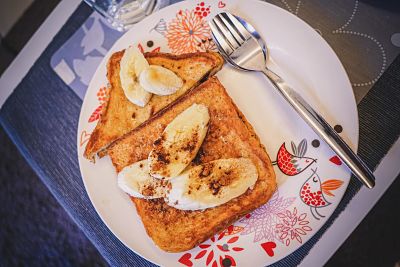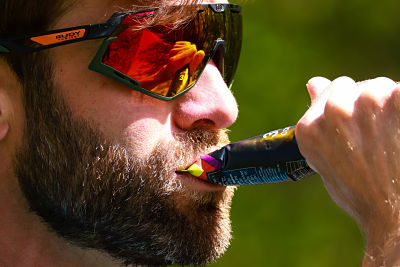Deciding how to approach nutrition in the few hours before a training session or race is one of the great fueling challenges for athletes. To help you hone your own pre-workout food intake, I've drawn on my MANY years of experience of honing my own strategy and looked at what scientific evidence says about what, how much and when you should eat before exercise...
Should you eat immediately before exercise?
I’m definitely a “Lark” to use a term borrowed from Matthew Walker’s brilliant book ‘Why We Sleep’. Because of my natural chronotype I have a tendency to start the majority of my workouts well before 7am, and occasionally before 6 (to the annoyance of my wife if my alarm is set too ‘loud’).
One knock-on effect of being an ‘early bird’ is that I tend to do most of my training on an empty stomach (except for a mandatory coffee) because both the thought and practicalities of eating anything significant before getting out of the door is quite unappealing at that time of day.
This approach works fine for me as most of my sessions are only up to about an hour long. Whilst I'm sometimes very ready for breakfast by the time I finish, it rarely feels like not eating beforehand is diminishing the quality or enjoyment of my training. I probably benefit from the fact that I’ve become habituated to this approach over many years, so physiologically and psychologically, it’s ‘normal’ as far as my body is concerned.
However, I do make a conscious effort to eat something quite carbohydrate-dense before a race, or any longer training session (~90 min or more), in order to ensure I’ve got sufficient energy to perform at my best. My current go-to before a long bike ride is a bagel with nut butter and honey. Without this, I find myself flagging late in the session.
The peer-reviewed science agrees that eating something carb-dense beforehand is basically a sound approach. In fact, the opening lines of a 2014 paper on the subject state:
“Carbohydrate feedings prior to endurance exercise are common and have generally been shown to enhance performance”.

How much carb should you eat before exercise?
The general recommendation for pre-exercise carb intake to maximise endurance performance is to ingest 1-4g of carbohydrate per kilo of body weight in the 1-4 hours prior to the beginning of exercise (i.e. 0.45-1.82g of carb per lb of body weight in the 1-4 hours before you begin exercising).
The mathematically inclined will have immediately figured out that these recommendations cover a broad target area; clearly chowing down 4g per kg around 1 hour before starting exercise is a very different proposition to nibbling just 1g per kg 4 hours before!
Despite their wide range, these guidelines do highlight the rough ballpark within which most athletes should be aiming to fit in their pre-exercise carb consumption, with the details to be refined through a trial and error process over time.
Clearly, for most people it will make sense to consume more (i.e. closer to 4g / kg) the further out you are from starting exercise but, if the pre-exercise time frame is more compressed, then taking in less is more likely to be appropriate. It also seems logical to assume that a more aggressive approach to pre-fueling is warranted for longer and more intensive efforts, whereas a lighter feed is probably appropriate for shorter or easier events.
The theory (one that seems to be borne out in practice) is that this level of carb intake ensures adequate energy availability - and ‘tops off’ liver glycogen stores in particular - if the event is first thing in the morning. These will have been more heavily depleted than muscle glycogen stores overnight because, whilst your muscles basically rest at night, your brain still needs fuel and this is ultimately drawn from liver glycogen.
It’s also worth mentioning that these recommendations make the assumption that your muscle glycogen stores have been adequately topped up in the 24-48 hours prior (the ideal window for carbo loading - the subject of a different article).
The best pre-exercise foods
Most experts agree that there’s a lot of personal preference (and a certain amount of superstition!) that goes into determining what constitutes the perfect pre-exercise food choices for an individual. With that being said, there are some fairly universal characteristics of suitable pre-exercise foods and these include:
- A high proportion of simple/digestible carbs (i.e. relatively low in fat and protein), to aid rapid digestion
- Low in fibre (for ease of digestion and to help avoid GI discomfort)
- Relatively ‘plain’ in taste (in general, simpler fare is easier to eat, even in stressful situations)
- Familiar, tried and tested in the past (to avoid any unforeseen negative consequences when the stress of race day is thrown into the mix)
- Easy to prepare on the spot, or to prepare in advance (to reduce unnecessary stress related to getting things ready in a compressed time frame)
My own go-to choices for a pre-exercise meal include porridge (oatmeal) with added honey or sugar, flapjack or oat-based energy bars, white bread or toast with honey or jam. Before longer events I frequently add some nut butter to help achieve a feeling of satisfaction or fullness and to help avoid my blood sugar spiking too much.
I’ve eaten some basic combination of the above before the vast majority of my biggest training sessions and races for a number of years now and find it to be a reliable way to start full of energy, but not bloated or feeling sick. The typical carb content of these foods are listed in the table below to give you some sense of the amount of each you need to eat to hit certain carb targets, based on your body weight.
| Item | Serving | Typical carb content |
|---|---|---|
| White bread | Slice | 12-15g |
| Honey | Tablespoon | 17g |
| Oatmeal/Porridge | 1 cup, cooked | 26g |
| Plain Bagel | 1 bagel | 45-55g |
| Flapjack bar | 1 bar | 40-50g |
Timing your pre-workout meal
The exact timing of the pre-race meal is something that’s very individual and depends on two key factors:
- The availability of feeding opportunities in the few hours before exercise
- How much time you feel you need to leave between finishing eating and standing on the start line.
Personally, I’ve never really had a problem with eating relatively close to the start (i.e. within the last 90 minutes or so) but given the choice I’d probably aim to finish the bulk of my intake about 2 hours out. Others need closer to the full 4 hours to avoid bloating or a stitch.
This is something you can only really learn by trial and error so it’s important to play around with timings to find out what works for you.
As already discussed, the commonly cited ideal window for the majority of pre-exercise carb intake is between 1 and 4 hours before the gun goes off.
The main reason for leaving at least a 60 minute buffer between your last substantial intake of food before a long or hard effort begins is simply to allow time for digestion and reduce the risk of GI distress, sickness or bloating during the early part of your race.
Find a strategy that works for you
Many athletes, myself included, also like to take a final little dose of carbs (usually about 30g in the form of an energy gel, or some concentrated sports drink) in the last 15 minutes before the start. This "pre-fueling" approach is so that the dose hits your bloodstream quickly, sparing your stored glycogen stores for use later on. I’ve always found this to be a good idea before very long races, where maximising fuel stores is a key determinant of success.

This final ‘top-up’ is not universally popular though, and the main reason cited by those who don’t favour it is a phenomenon called ‘Reactive Hypoglycemia’ which can sometimes occur once you get going.
Reactive hypoglycemia (sometimes also called rebound hypoglycemia, or postprandial hypoglycemia) describes a dip in blood sugar levels that can leave you feeling weak and shaky in the same way you do when you ‘bonk’, even though you’re not actually low on muscle glycogen at that point in time.
It’s thought that the underlying cause of this kind of dip in blood glucose levels during exercise is an excessive amount of insulin being released in response to carbohydrate ingestion, causing glucose to be removed from the blood at the same time it is also being used rapidly by your muscles.
As a result of this ‘double whammy’ effect, circulating glucose in the blood drops below acceptable levels for a period of time and you feel it as a horrible dip in energy, concentration and motivation. Whilst this often passes once your body resets itself, it can be unpleasant and potentially affect performance if severe enough.
Although it’s thought to affect very few athletes, reactive hypoglycemia is surprisingly frequently cited as a reason to avoid carb intake in the immediate run up to an event by many, as this quote from PH ambassador Bex Rimmington highlights:
The main reason [that I avoid carb intake immediately pre-exercise] is that I worked with a nutritionist who said that you have enough glycogen stores for the first 90 mins of exercise and that taking glucose immediately before the start causes a massive spike followed by an insulin response which can affect performance.
In reality - and as is the case with most aspects of pre-race feeding - figuring out your personal response to taking in a gel in the final 15 minutes before a hard effort is the key to deciding whether it’s something you should or should not be doing, albeit with the odds appearing to be stacked in favour of the idea that it will be beneficial rather than detrimental.
There’s no single right way of approaching pre-exercise feeding; it all depends on your individual physiology.
As an aside, continuous glucose monitoring (CGM) devices in sport may be able to help us work out our best individual approach by providing real time data on blood glucose responses to different foods and events. This is something we’ll be keeping a close eye on ourselves as it becomes more widely adopted.
